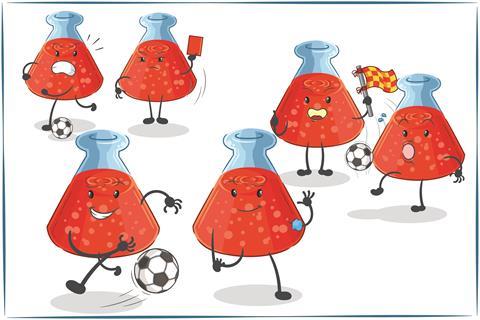Bring your A game to the classroom to help students transfer their skills from the football pitch or debating club to the science classroom

James is an excellent footballer. He is punctual, can critically analyse his game, effectively communicates with his team and reliably leads them to victory.
However, in the classroom, James is often unfocused and struggles to answer questions well. Despite his teacher’s encouragement to apply his discipline from football to his learning, James finds it difficult even to begin to answer a question such as ‘Explain why at room temperature chlorine is a gas and sodium chloride is a solid.’
This is not uncommon; many students excel in one area but struggle to transfer their skills elsewhere.
Perhaps, one might say, James is simply not motivated because he doesn’t enjoy learning.
Yet it strikes me that enjoyment and engagement in any area of life can be increased by success. So how can teachers bring about success where there is currently a lack of enthusiasm?
The importance of subject knowledge
The key, I believe, is in establishing a robust foundation of subject knowledge.
James’ prowess on the football field is down to his learned understanding of the game. It follows that if James acquires a sound understanding of a science topic, he will be able to think critically about and answer questions on the topic.
Students who are secure in their subject knowledge are more able to transfer the critical, analytical and communication skills they’ve acquired outside the classroom to their learning in the classroom. This makes for better answers, increased motivation and greater success.
Here are five simple, yet effective strategies to help your students secure subject knowledge. I regularly use them in my teaching with great outcomes.
Explain it well
Before introducing new content, refer to relevant prior knowledge so students can make meaning. This means they can tether new content to previously established schemas.
Break concepts down to their core components while maintaining the thread running through them. For instance, when teaching digestion, I live draw each part and link back to each section to make the story of digestion clear.
In his book, Teaching Secondary Science, teacher Adam Boxer urges us to consider the direction of travel when introducing new knowledge. For example, when teaching ionic bonding, begin with the concrete idea of properties such as high melting points before moving on to the bonding and structures of compounds.
Model it
Demonstrate to students how to tackle calculations or construct a response to questions that link different concepts together. For example, to explain how increased atmospheric carbon dioxide concentrations can negatively affect biodiversity, I show students how to link together the carbon cycle, global warming and distribution of animals and plants.
Check for understanding
Ensure that students fully understand the content and do not hold any misconceptions. Consider the medium and the content of your check. For example, using mini whiteboards to check for understanding means you can view the responses of all your students.
Ask questions such as ‘A group of sperm cells is called a tissue as there are many of them that have the same function. Explain why this statement is wrong.’ These questions probe and test understanding to check that students are forming the right meaning and schemas in their memories.
Support independent practice
Provide opportunities for independent practice to build confidence and automaticity. Carefully consider the questions you provide for practice so they incorporate simple recall, application to new contexts, interleaving and spacing, and includes practise of different types of knowledge.
Encourage review and retrieval
Frequently encourage students to retrieve knowledge through classroom questioning and regular homework. This makes retrieval a constant action, helping students forget less and build strong connections between related concepts. Start lessons with general retrieval practice, activate relevant knowledge before teaching new material and encourage linking of current learning to the bigger concept through lots of questioning.
For example, in a lesson introducing ionic bonding and structures, begin with retrieval of various topics from the course, pose questions on charges and atomic structure as a pre-requisite check and link structures with properties of ionic compounds. When used consistently and effectively, and combined with regular feedback, retrieval practice allows students to robustly transfer knowledge and skills.











No comments yet